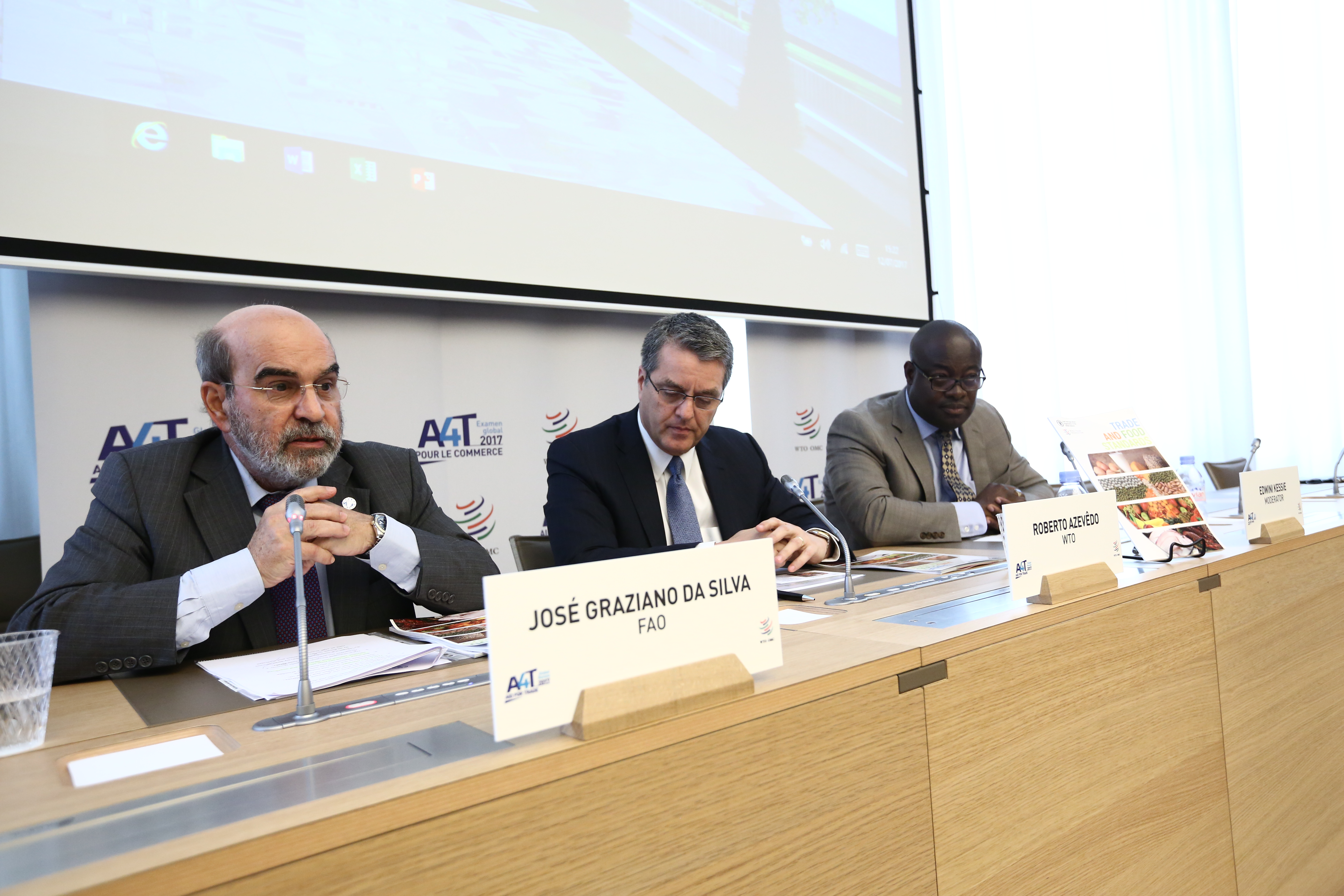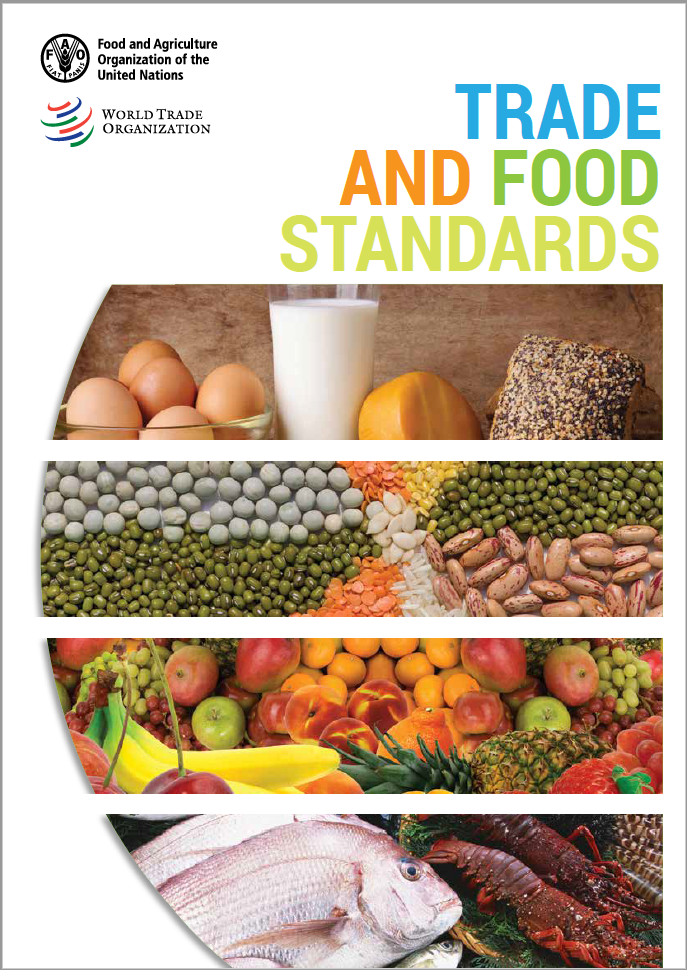Food standards can make global food trade more inclusive
Food safety and food standards are crucial to unlock the potential of an important tool to fight hunger, which is trade.
FAO Director-General
José Graziano da Silva.
Trade in food is difficult to imagine without standards. Food standards give confidence to consumers about the safety, quality and authenticity of what they eat. By setting out a common understanding on different aspects of food for consumers, producers and governments, harmonization on the basis of international standards makes trade less costly and more inclusive. Food standards and trade go hand in hand in ensuring safe, nutritious and sufficient food for a growing world population.
FAO Director-General José Graziano da Silva and WTO Director-General Roberto Azevêdo stressed that participation in the way international food standards for trade are set and governed is essential if countries are to reap the benefits of booming global trade and prepare for emerging technological changes.

Developing countries in particular should invest more resources in making sure they have the capacity, skills and policy focus to achieve effective engagement in institutions such as Codex Alimentarius, the world’s preeminent international food-standard-setting body.

In a new report, Trade and Food Standards, the UN Food and Agriculture Organization (FAO) and the World Trade Organization (WTO) offer a concise explanation of how international food standards are set and applied. The harmonization of standards aims to bolster public health, reduce the burden of compliance on producers and minimize the risk of costly disruptions to trade.
There can be no food security without food safety
While emerging economies have recently begun to significantly increase their participation in key Codex committees, levels of participation by many least-developed country members remain low.
One key message of the book is that countries will get most value from Codex if they bring together government officials, agriculture, health, industry and trade experts as well as consumer and producer groups to identify national food safety priorities.
The publication also illustrates some of the drivers of change in the area of food regulation –digitalization, new production and processing technologies, and e-commerce, as well as labelling trends, new trade deals and changing dietary and consumer preferences – that will all have an increasingly profound impact on the food trade and food safety landscape.
Did you know?
At the WTO, in the SPS and TBT Committees, members monitor the trade impact of food safety and other food related issues.
At the heart of the Codex mandate are the core values of collaboration, inclusiveness, consensus building and transparency. Governmental and non-governmental, public and private organizations alike play a vital role in ensuring Codex texts are of the highest quality and based on sound science.
Codex would have little authority in the field of international standard setting if it did not welcome and acknowledge the valuable contributions made by observers. Expert technical bodies, industry and consumer associations
contribute to the standard-setting process in a spirit of openness, collaboration and transparency.
Intergovernmental organizations (IGOs) and international non-governmental organizations (NGOs) can apply for observer status in Codex in order to attend and put forward their views at every stage of the standard-setting process.
 Current Codex Alimentarius Commission
Current Codex Alimentarius Commission
Food standards can make global food trade more inclusive
Food safety and food standards are crucial to unlock the potential of an important tool to fight hunger, which is trade.
FAO Director-General
José Graziano da Silva.
Trade in food is difficult to imagine without standards. Food standards give confidence to consumers about the safety, quality and authenticity of what they eat. By setting out a common understanding on different aspects of food for consumers, producers and governments, harmonization on the basis of international standards makes trade less costly and more inclusive. Food standards and trade go hand in hand in ensuring safe, nutritious and sufficient food for a growing world population.
FAO Director-General José Graziano da Silva and WTO Director-General Roberto Azevêdo stressed that participation in the way international food standards for trade are set and governed is essential if countries are to reap the benefits of booming global trade and prepare for emerging technological changes.

Developing countries in particular should invest more resources in making sure they have the capacity, skills and policy focus to achieve effective engagement in institutions such as Codex Alimentarius, the world’s preeminent international food-standard-setting body.

In a new report, Trade and Food Standards, the UN Food and Agriculture Organization (FAO) and the World Trade Organization (WTO) offer a concise explanation of how international food standards are set and applied. The harmonization of standards aims to bolster public health, reduce the burden of compliance on producers and minimize the risk of costly disruptions to trade.
There can be no food security without food safety
While emerging economies have recently begun to significantly increase their participation in key Codex committees, levels of participation by many least-developed country members remain low.
One key message of the book is that countries will get most value from Codex if they bring together government officials, agriculture, health, industry and trade experts as well as consumer and producer groups to identify national food safety priorities.
The publication also illustrates some of the drivers of change in the area of food regulation –digitalization, new production and processing technologies, and e-commerce, as well as labelling trends, new trade deals and changing dietary and consumer preferences – that will all have an increasingly profound impact on the food trade and food safety landscape.
Did you know?
At the WTO, in the SPS and TBT Committees, members monitor the trade impact of food safety and other food related issues.
 Codex and Observer
Codex and Observer
around the world since ancient times.
We might not always know where it comes from,
but we expect it to be available, safe and of good quality.











Leave a comment